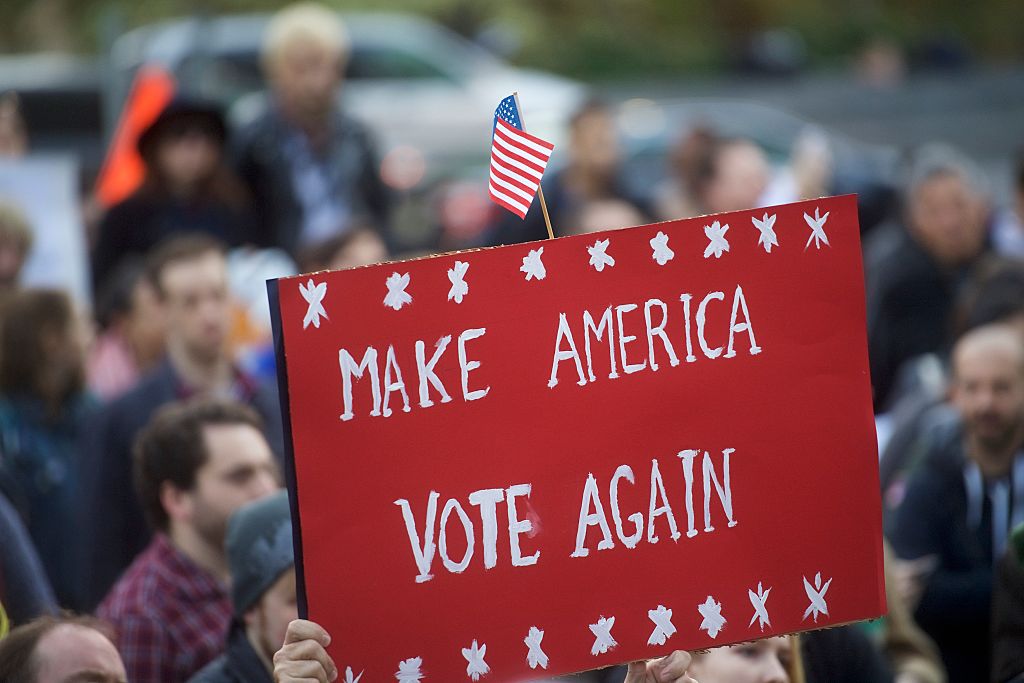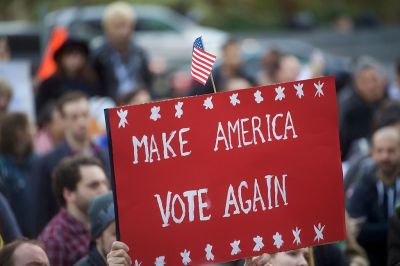Can states frustrated with the Electoral College circumvent it, even without a constitutional amendment?
Lawmakers in 16 states and the District of Columbia think so: Their legislative bodies have passed measures pledging their electoral votes to the presidential candidate who wins the national popular vote, regardless of how the candidate actually fared in those particular states.
But the effort’s critics—and even some supporters—say that the compact creates a host of constitutional concerns.
How does it work?
The endeavor is known as the National Popular Vote Interstate Compact (NPVIC), and the 16 states and District of Columbia currently represent 205 electoral votes. The compact would not take effect until states representing a majority of the electoral votes (270 out of 538) have signed onto the agreement. Michigan lawmakers are currently considering voting on the law (which could bring the compact to 220 votes).
The compact’s designers address what they saw as problems with the Electoral College but avoid the arduous effort of amending the Constitution. Hence the problems with the effort.
“Objectively, people in a state like California are less represented on Election Day than people in Wyoming,” Ryan Burge, a political science professor at Eastern Illinois University says. But, Burge adds, “it creates a constitutional crisis because it clearly is a violation of the spirit of the Constitution” when it comes to presidential elections.
Where did the idea come from?
Changing the Electoral College is not a new idea: Since the 1800s, members of Congress have introduced more than 700 proposals to either reform or abolish it, according to the nonpartisan Congressional Research Service (CRS). Yet they all failed to gain serious traction.
The seeds for the idea of the compact were sown in the wake of the 2000 election, when George W. Bush won the presidency despite Al Gore winning the popular vote. This has happened a handful of times throughout American history, going back to 1824 when John Quincy Adams’ win over Andrew Jackson was determined by the House of Representatives. The most recent example is 2016, when Hillary Clinton got nearly 3 million more votes than Donald Trump but 77 fewer electors.
In 2001, some scholars argued the U.S. could adopt a national popular vote approach through state legislation rather than by amending the Constitution, laying the groundwork for the concept of NPVIC. Activists and organizers took up the baton and John Koza, a former elector, founded the group in 2006.
What do supporters say?
The compact seeks to address what supporters call inequality caused by the Electoral College’s “winner-take-all” approach in which a single vote in a less populous state is worth more than a single vote in a more populous state.
The group holds that switching to their approach would ensure that the “people’s choice” always wins in every election, according to the Congressional Research Service: “Every vote would carry the same weight in the election, no matter where in the nation it was cast. No state would be advantaged, nor would any be disadvantaged.”
“The current state-by-state, winner-take-all Electoral College system of electing presidents is creating ever-closer contests in an ever-smaller number of closely divided states for elections that aren’t really that close,” former U.S. Secretary of Labor Robert Reich, who supports NPVIC, argued in an op-ed earlier this year.
Supporters also say a national popular vote scheme would encourage presidential candidates focusing on battleground states at the expense of others.
Alex Keyssar, a Harvard historian, supports the efforts of NPVIC. But he tells The Dispatch that the endeavor has potentially fatal flaws when it comes to constitutionality, and he believes that the better solution would be a constitutional amendment. Nevertheless, the compact is “a good method of building national support for change,” he argues.
What do critics say?
“I think there are major unsettled constitutional issues,” University of Iowa law professor Derek Muller tells The Dispatch. “It’s much less preferable than amending the Constitution, but it’s the path being taken because it’s the easier one.”
Muller and other scholars have argued that the compact, ironically, runs afoul of the Constitution’s compact clause. That provision says that without the consent of Congress, states shall not “enter into any Agreement or Compact with another State.”
While states not party to the compact can still appoint electors, the compact “makes such an appointment meaningless,” he says.
The NPVIC “is a political compact that infringes upon the ability of other states to appoint their electors, and one that strengthens the political position of compacting states,” he wrote in a 2007 Election Law Journal article.
Critics also point out that NPVIC does not account for how to tabulate a national popular vote, since election laws vary from state to state. Andy Craig with the libertarian Cato Institute argued the compact’s most serious problem is that it “assumes the existence of a traditional popular vote total in each state but it provides no details on how that is to be ascertained.”
The different ways states calculate votes—including through ranked choice voting, which could lead to conflicting interpretations of whether votes would be counted on the first or last round—create a recipe for disaster. “It could throw the outcome of a presidential election into doubt without any clear rules for determining who rightfully won,” Craig wrote.
How likely is it that the compact will take effect?
The following states already belong to the compact: California, Colorado, Connecticut, the District of Columbia, Delaware, Hawaii, Illinois, Massachusetts, Maryland, Minnesota, New Jersey, New Mexico, New York, Oregon, Rhode Island, Vermont, and Washington.
Political observers say it will be a tough feat for the group to get enough states to reach the 270 threshold, at least in the near term, especially since only blue and purple-leaning states have signed on. Red states don’t seem interested.
“If you look at the math of what has to happen for it to get to the number, to get to 270, I think there’s a lot of impediments,” Burge said. “I think this is like a fun thought experiment, but it’s never going to happen. It doesn’t work that way.”






Please note that we at The Dispatch hold ourselves, our work, and our commenters to a higher standard than other places on the internet. We welcome comments that foster genuine debate or discussion—including comments critical of us or our work—but responses that include ad hominem attacks on fellow Dispatch members or are intended to stoke fear and anger may be moderated.
With your membership, you only have the ability to comment on The Morning Dispatch articles. Consider upgrading to join the conversation everywhere.